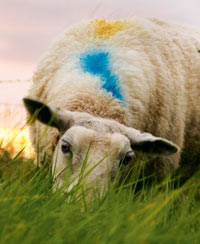Kiwi broadside in battle against British lamb

New Zealand farmers have landed a blow in their battle to show lamb shipped to shops halfway around the world can be as environmentally friendly as lamb from Britain’s uplands.
A typical 100g serving of New Zealand lamb exported 11,000 miles to Europe has a carbon footprint equivalent to 1.9kg of CO2, according to university researchers. But transport accounts for just a fraction of emissions.
The paddock-to-plate AgResearch study set out to find out where greenhouse gas emissions occur across the supply chain. It was part-funded by New Zealand’s Ministry of Agriculture and Meat Industry Association (MIA).
Some 80% of greenhouse gas emissions occurred on-farm. Meat processing contributed 3% with a further 12% coming from the consumer phase, including cooking. Transport accounted for just 5% of emissions.
“Transport distance influences only a small fraction of the total footprint,” says the report. “Focusing solely on this small fraction is an inappropriate and potentially misleading means of assessing the overall impact of emissions from a product.”
The document warns against comparisons with other studies, arguing that the absence of any standardised international methodology is a major challenge when evaluating the carbon footprints of different food products.
But MIA chairman Bill Falconer said: “We are confident New Zealand’s low-input and efficient farming, along with our high proportion of renewable energy and temperate climate, mean our lamb will compare very favourably.”
The New Zealand sheep industry had already reduced its carbon footprint by more than 20% over the last 20 years – mainly by producing more meat from a smaller flock using less pasture, which in turn meant fewer emissions.
The industry would remain on the front foot in its approach to on-farm emissions, said Mr Falconer. “It is likely that the small proportion of the footprint contributed by transport and processing costs – 8% together – will also compare well.”
But Welsh sheep farmers reacted angrily to the suggestion that food miles do not matter.
Farmers Union of Wales president Gareth Vaughan said: “No matter how much smoke and mirrors importers use to claim their product is more environmentally friendly, anyone with an ounce of commonsense can see that a lamb reared in the uplands of Wales and served in Wales is going to be better for the environment than an animal that has come halfway around the world.”
Madeleine Lewis, of the industry-led Farming Futures partnership, said the report was important but less than comprehensive. “This is just part of the picture – it should not be seen as the only measure of carbon-friendly farming.”
Sheep farming was often the only type of agriculture possible on Britain’s uplands, which were important carbon sinks. It was also important that consumers to buy British to support the domestic rural economy.
